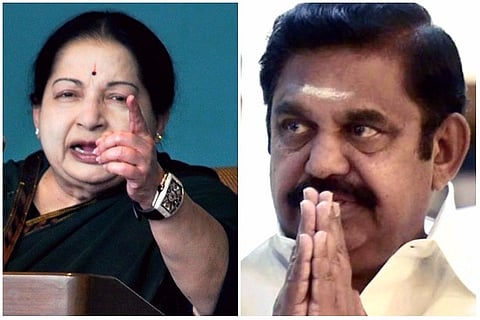

The joke among reporters in Tamil Nadu often went, “If you can be a journalist here, you can be a journalist anywhere.” Information and communication – vital for any reporter to do his/her job was largely restricted in the state, especially under the tenure of late Tamil Nadu Chief Minister J Jayalalithaa. After all, it was a government that hardly ever spoke to the media, and therefore the public. And even if it did, it was only through press releases.
For years, Jayalalithaa and her administration remained off-limits to the press corps, with a gag-order imposed on ministers, legislators, party functionaries and bureaucrats. Inaccessible to the media until the very end, the former AIADMK supremo’s contempt for anyone who was critical of her regime was well-known. Her attempts to intimidate and muzzle the freedom of the press have also been documented in the form of 213 defamation cases filed in her tenure as CM between 2011 and 2016.
But it’s been nearly seven months since Jayalalithaa passed away, and nearly five months since Edappadi Palaniswami was sworn in. And while EPS may harp on about “running Amma’s government”, what of his regime’s relationship with the media? TNM spoke to a few journalists from Tamil Nadu, who have witnessed the transition of power up-close.
Bridging the communication gap
Unlike Jayalalithaa’s tenure, most journalists admit that ministers are now more accessible, and willing to speak to the media. “Some ministers speak to the media. This started during the political crisis following O Panneerselvam’s rebellion, when everyone wanted to come into the limelight. But while there are these sound bytes on political reactions, ministers aren’t forthcoming with details on critical issues like drought, the drinking water crisis or the farmers’ issue,” points out a journalist who works with a national English news channel. He adds that what little information he sources comes from bureaucrats, who often fear that they are being tracked. “Bureaucrats who trust us will give information. But they too are scared, often calling me back from on another number.”
Rahul*, a print reporter also observes, “You may or not get the information you desire, but ministers and ruling party MLAs are more accessible now than before and can be contacted over the phone. Last year during the election time, you could hardly have an interaction with the same people. They will even speak in English.”
With TN Secretariat as his beat for the last few years, Ajay* a reporter for a Tamil news channel, says a lot has changed since Jayalalithaa passed away. “Secretaries speak off the record, ministers talk to reporters and many address the media when it comes to their department and during the launch of schemes. As far as TV channels are concerned, we are allowed to go live for government events with arrangements made for us. We are also allowed to go to the CM’s chamber – which was earlier inaccessible – to take visuals,” he notes.
A CM who speaks to reporters outside of Chennai
But while his ministers have become more accessible, the CM himself has given only one press meet since he took office. Both the English news channel journalist and Ajay point out that EPS does give the occasional sound byte – but only to reporters outside of Chennai. “He will speak to reporters in Coimbatore, in Salem, Pudukottai. He knows tough questions won’t come his way there,” says the English news channel journalist.
Rahul compares EPS to how former Finance Minister P Chidambaram treats the press in Chennai as opposed to their counterparts in New Delhi. “It’s a Chidambaram kind of scenario, where he will speak to reporters elsewhere but not in Chennai. But even on the day EPS gave a press meet at the Secretariat, he did not field too many questions. It was just a show,” says the print reporter.
However, an editor with a leading Tamil news channel disagrees with this observation by field reporters, noting that he has met with the CM on several occasions. “He is ready to talk about the administration. But reporters want to know about the internal feud in the AIADMK. He has been meeting people, having informal interactions with select journalists. He had given an interview to Vikatan –where they spent the whole day with the CM. There is accessibility,” says the editor.
Accessibility, but no accountability?
But it’s not just accessibility that has changed under the EPS government. He points out that the state bureaucracy is functioning with a lot more freedom these days. “Respective ministers are giving freedom to secretaries. The good name may finally fall with the minister but the work is being executed by the secretaries,” he explains. However, the editor alleges that corruption is the order of the day, with ministers and bureaucrats claiming their slice of the pie.
But as far as media and the government is concerned, the editor optimistically says, “This is the best time for journalism in Tamil Nadu. There is no control over ministers and bureaucrats, there is no fear psychosis. There is no pressure on the press from the ruling party. There have been no defamation cases so far.”
But his optimism is not shared by many of his peers. The English news channel reporter believes the same opaqueness continues after Jayalalithaa. “The only difference now is that there is from the TV’s point of view there is a face for political bytes. But it’s just competitive politics among second rung leaders who want to prove they work for Amma’s government. In terms of accountability and governance, there is nothing. Like PM Modi, it is a manipulative attempt to seem accessible, but they are not.”